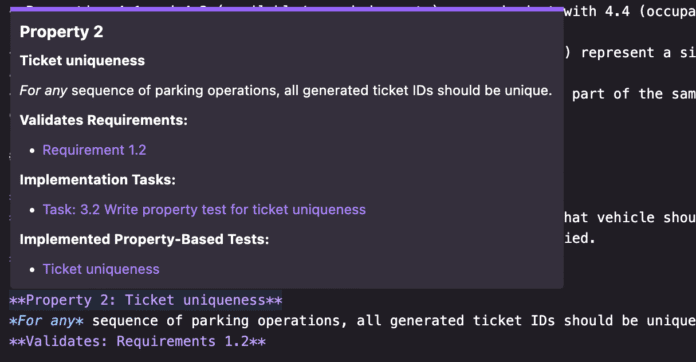Kiro, the AI-driven development platform that introduced spec-based workflows earlier this year, has moved from preview to general availability with a slate of new features aimed at improving reliability, collaboration, and developer control. Since its preview launch in July, Kiro has seen notable adoption of its structured “Specs” approach, which encourages teams to define system behavior before generating code with AI.
Also read: Kiro Debuts as an AI IDE Aiming to Close the Gap between Prompts and Production
Over recent months, the platform expanded support for remote Model Context Protocol (MCP), global steering files, dev-server workflows, its Auto agent, and more flexible specifications with optional tasks. At general availability, Kiro is adding four new capabilities: property-based testing for spec correctness, progress checkpointing, a command-line interface, and centrally managed team plans.
Strengthening code reliability with property-based testing
A core release is Kiro’s new property-based testing (PBT) system, which evaluates whether generated code actually meets the behaviors outlined in a specification. Rather than checking a fixed set of examples, PBT generates hundreds or thousands of combinations of inputs and edge-case scenarios derived directly from the project’s requirements.
Kiro extracts these testable properties from EARS-formatted specs—statements such as “THE System SHALL allow authenticated users to view active listings.” It then probes the implementation for counter-examples, using a technique known as shrinking to identify minimal failing cases. When issues arise, Kiro can propose fixes to the code, the specification, or the generated tests.
The company positions PBT as a way to uncover discrepancies between intended and actual behavior in cases that human-written tests are likely to miss.
Checkpointing to rewind agent-driven changes
Kiro now creates an automatic checkpoint every time its agent takes an action. Developers can roll back to any earlier point in the workflow without discarding progress, reducing the need to regenerate work or spend additional compute credits. The feature is designed to help teams iterate without fear of losing partially completed implementations.
Support for multi-root workspaces
The platform now supports working across multiple project roots in a single session, a feature aimed at teams managing complex repositories with multiple submodules or package structures. Kiro’s agent can navigate and modify files across all defined roots simultaneously.
Kiro enters the terminal with a new CLI
The new Kiro CLI brings the platform’s agents directly into the terminal, enabling developers to build features, trace bugs, automate workflows, and review errors without switching environments. The CLI uses the same steering files, MCP settings, and context rules as the IDE. The tool includes access to Claude Sonnet 4.5, Claude Haiku 4.5, and the Auto agent. It supports reading and writing local files, calling APIs, and running bash commands. While spec creation isn’t yet supported in the CLI, existing Specs can be used, and teams can build custom agents geared toward specific domains, such as backend or frontend workflows.
Team plans for centralized management
For organizations adopting AI-assisted development at scale, Kiro has introduced team plans with centralized management features, enabling shared settings, policies, and oversight across development groups. With these updates, Kiro aims to position its platform as a structured, testable, and collaborative environment for AI-assisted software development, bridging automated code generation with the kinds of guardrails typically expected in enterprise engineering workflows.







